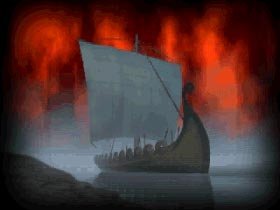
Those Dreaded

Viking raids along the British and Irish coasts began around 790 AD when Danish Vikings landed at Lambey, Ireland in 793 AD and landed two years later near Lindesfarne, England.
Known as "Nordmanni", by 841 AD the Vikings began to run into stiff and organized resistance on the coasts of Ireland and England. Faced with mounting casualties, they decided to raid softer targets in Europe.
Charlemagne’s Holy Roman Empire in 840 AD was a prime target for Viking Longboats because navigable rivers Somme, Loire, Garonne and Seine were easily traversed highways of commerce leading into the undefended underbelly and vast resources of France.
The fierce Viking warriors found it easy to sail or row upriver to the cities of Rouen, Bordeaux, Amiens, Angers, Nantes and Paris. News of the approach of dragon-prowed long boats was enough to spread terror throughout the land.
Aiding the Vikings was the fact that Charlemagne’s Empire of 840 AD was in turmoil. He had passed his empire down to his grandsons, young Lothair, Louis, and Charles. After his death, the brothers fought among themselves for control of France.
About 841 AD Viking Commander, Ragnar Lodbok rowed up the river Seine and sacked the rich city of Rouen. Then he boldly moved on Paris, set up camp on the Isle de France and from there threatened to burn Paris. Faced with a catastrophe of epic proportions, the three Charlemagne brothers collected silver with which to bribe the Vikings to leave.
In Germany, Saxon leader, Emory, broken by many years of Viking raids, decided that the only way his people could be stronger was to steal from weaker neighbors. To fight Vikings, the need was strong for horses, cows, geese, chickens, seed to replant burned fields, young women to replenish the race, and food to feed his people.
It is historically evident that the Saxons in time rebuilt their country, build fortifications along the rivers and grew strong enough to drive the militant Vikings from the rivers. Some of those Vikings settled down in Normandy, became Christians, learned to speak French and were absorbed into the Norman Culture.
In time the wild Vikings had drawn far too much attention to themselves. The Saxon leaders in Normandy signed a treaty with the King of England to deny use of the English Channel to the Vikings of Denmark. After that, the Vikings had to go sail around England to service their Trading posts in Ireland.
Meanwhile, to the Vikings of the old school, the handwriting was on the wall, to give up raiding and concentrate on trading. Some diehard Vikings still raided up Ireland rivers, but by the fifteenth century it was clear that survival dictated their future commercial enterprises had to be limited to trade.
Viking trading posts continued doing business long after the defeat of the Vikings at Clontarf. In time those outposts grew to become modern Irish cities of Dublin, Wexford, Waterford and Wiclow.
by donkelly 1997